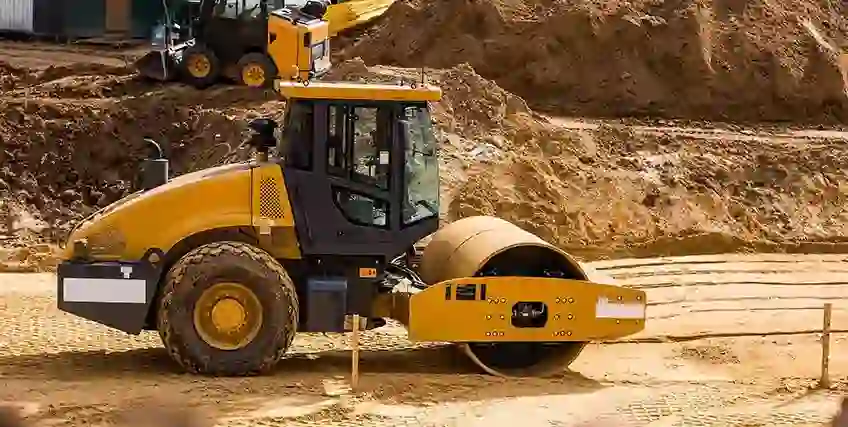The Role of Business Loans in Expanding Heavy Construction Companies
November 12, 2025 | Last Updated on: November 12, 2025

Construction companies typically work on a project basis, often having to manage significant changes in working capital and cash flow needs. Contractors have to manage substantial expenses associated with building materials, labor, and heavy equipment financing necessary to complete major construction projects.
Like other types of businesses, construction companies often look for business loans for support to cover project costs. But in addition to short-term funding for project costs, construction financing can also be very useful in helping construction companies grow and expand, especially through heavy equipment financing.
In this article:
- How construction company business owners can use financing solutions to finance construction equipment and other business needs.
- The best heavy equipment financing options to support construction companies, from loan options to lines of credit.
- How to apply for heavy equipment financing to support your construction business.
Why Financing Fuels Growth in Heavy Construction
In the heavy construction industry, it can be very difficult to balance cash flow due to significant upfront expenses, long payment windows from clients, and unpredictable material and project costs. Not only can financing support specific construction projects to provide financial stability, but construction financing can cover long-term needs, like new equipment and hiring staff. Loans can also provide the business financing necessary to bridge payments between jobs, expand operations to bid on larger projects, and support heavy equipment financing to invest in new technology.
Business expansion is the goal in most industries, but it’s particularly vital for construction companies dealing with high costs and a rapidly changing financial situation over time. Construction business loans can provide some consistency and help fuel growth.
The Capital Demands of Growing a Heavy Construction Business
The construction industry can be incredibly lucrative, but it’s also highly cyclical and subject to seasonal fluctuations and economic downturns that can impact project timelines and cash flow. Some of the major capital demands on a construction business include:
- High upfront costs to bid on projects, hire labor, get heavy equipment financing for project needs, and more.
- Extended payment cycles that may create months-long payment delays from when the work is done.
- Stringent qualification criteria that can make it difficult to find the right financing for some types of loans.
- Higher interest rates on short-term loans, which may increase the cost of borrowing.
Construction business owners must carefully consider their financing needs when exploring financing options. Traditional banks may be reticent to give small business loans to contractors with the unique needs of a construction business due to the industry’s volatility. Nonetheless, there are construction financing options out there for you, even if you have to be a bit creative.
Types of Business Loans for Construction and Heavy Equipment Financing
Depending on your specific business needs, there are many potential financing options for your situation. We break down some of the most common here.
Term loans
Conventional term loans provide an upfront lump sum in exchange for a regular repayment schedule over a period of time. Depending on their business plans, construction businesses may benefit from both short-term and long-term financing.
Term loans can be used for virtually any business purpose, from consolidating additional debt and purchasing materials for large-scale infrastructure projects to heavy equipment financing, hiring skilled labor, and much more. You can spend your loan amount on what will support your business most in either the near- or long-term, and repay the amount with regular monthly payments.
Both traditional banks and online lenders offer term loans. Traditional lenders tend to have stricter eligibility requirements and loan application processes, but lower interest rates and more favorable terms. Online lenders tend to offer faster funding and easier qualification requirements.
SBA loans
The United States Small Business Administration (SBA) offers a range of loan programs that can support construction companies. Whether you’re looking for heavy equipment financing, project-based financing, or to fuel business growth, the SBA offers competitive rates on loans and lines of credit designed specifically to serve construction businesses. Eligibility requirements are strict, but if you have a strong credit history and profitability record, SBA loans may offer the best terms.
Business lines of credit
A business line of credit gives you access to a maximum loan amount, but only charges interest based on what you withdraw from the credit line. This offers construction managers flexible funding to support specific project needs. The money works like cash, so you can use it to hire staff, as heavy equipment financing, or anything else. The SBA’s Construction CAPLines program is a good example of how lines of credit can be especially useful for project-based industries like construction.
Equipment financing
Construction companies have significant equipment and machinery needs. Of course, purchasing equipment isn’t cheap, especially when it’s major construction equipment. Heavy equipment financing is a must for most businesses, and lenders can support both lease and purchase financing.
Each construction company may be at a different place in its business lifecycle, so you may need support with heavy equipment refinancing to reduce loan costs on equipment you’ve owned for a while, or financing to purchase new equipment. In either case, lenders can help.
Heavy equipment financing typically works like a term loan. You receive a lump sum capital loan to purchase the equipment, and then must meet the repayment terms, which usually require monthly payments. Often, these types of loans are heavy equipment collateral loans, meaning the equipment itself serves as collateral for the loan, making them easier to qualify for and ensuring you don’t have to offer up any other business or personal assets as collateral. You could reduce the total cost of the loan by making a down payment.
How to Get a Loan for Your Construction Business
To get a construction loan or heavy equipment financing, follow these steps:
- Evaluate your financing needs: Whether you only need heavy equipment financing or you have several project needs, the scope of your financing needs will determine the type of loan you apply for. Using a business loan calculator may help you figure out how much loan you can afford.
- Compare lender requirements: Lenders may have varying requirements between different loan types, so it’s important to shop around to see what may be required. Typically, lenders consider your credit score, time in business, and annual revenue, but they will also likely need to see additional documentation, like tax returns and a business plan. Always review a lender’s repayment terms, interest rates, fees, funding speed, and application process to determine what’s right for you.
- Gather documentation: The documentation you need will depend on the lender you choose. Typically, banks and credit unions require more documentation than an online lender. Nonetheless, you’ll usually need a business license, bank and financial statements, tax returns, a business plan, and you may need to provide a down payment for some types of loans.
- Apply: Traditional lenders may require you to apply in person for some types of financing, while most online lenders allow you to complete the process entirely online. For heavy equipment financing, you can usually apply and get approved for financing through the vendor or retailer. Banks and credit unions usually have a longer underwriting and approval process than online lenders.
Final Thoughts
Whether you’re looking for a business expansion loan or specific heavy equipment financing, business loans can be a major asset to construction companies. Different types of financing can cover short-term project needs, allow you to bid for larger projects, support cash flow management, and much more. Finding the right financing for your business depends on your current needs and eligibility.
FAQs
How do construction loans work?
The goal of construction loans is to help cover the significant costs associated with construction projects, or fuel business growth. Usually, you borrow an amount of money and have to pay it back, plus interest, over a period of time, typically with monthly payments. You can often use loan proceeds for any business need, but loans like heavy equipment financing that are tied to specific pieces of equipment must be used for that particular equipment.
What is the difference between heavy equipment financing and leasing?
Leasing is a form of heavy equipment financing. However, there is a difference between leasing and buying. When you lease equipment, you’re effectively paying installments to rent the equipment for a period of time. At the end of the lease period, you may have the option to return the equipment or buy it outright.
What are the best heavy equipment financing options?
Heavy equipment financing options include lease or purchase options from banks that are tailored specifically to that piece of equipment. Usually, this is the best way to buy equipment rather than buying it outright with the proceeds of a term loan. Equipment loans may have competitive interest rates and terms that make the loan affordable, so you can free up other loan proceeds for more pressing business needs.
How can you use a construction loan?
You can use a construction loan for virtually any business purpose, including hiring staff, buying equipment, acquiring raw materials, purchasing real estate, and much more.
How to get a construction loan?
The application process varies between lender and loan type, but usually you’ll need to determine how much funding you need and how you plan to use the loan proceeds. That will inform where you might qualify and what kind of loan to apply for. Then, you’ll need to gather documentation like your business licensing, financial statements, and tax returns to file with your application. Then, just wait for approval and funding.




